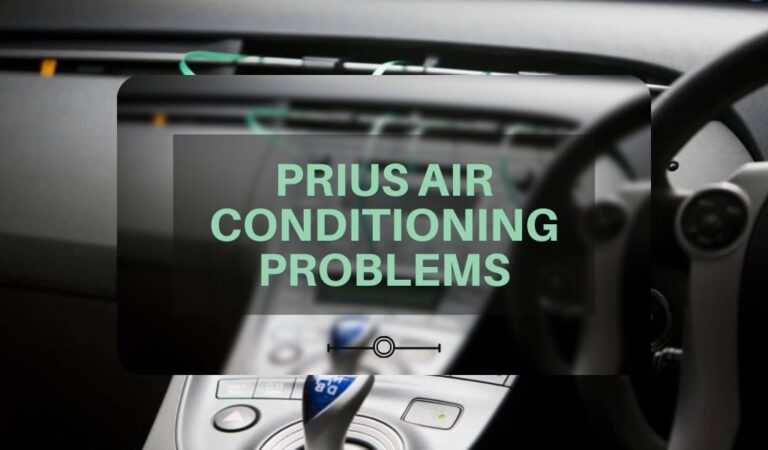Modern Car users have a range of problems to contend with and how to sort Prius air conditioning problems is top among them. Given the need to maintain a suitable body condition while driving, the demand for AC-fitted cars has been on the rise.
Much of this is evidenced in the fact that car dealers are always keen to give details of the features of the Air condition systems of their cars in a bid to improve the chances of making a sale.
However, since the use of a product doesn’t translate to having technical knowledge about the product, diagnosing and fixing air conditions often constitute a challenge to car owners.
But before you dive in with both feet, don’t forget that other components of your Prius may need attention too, such as the key battery, which can be replaced following a simple procedure.
Symptoms of Prius Air Conditioning Problems
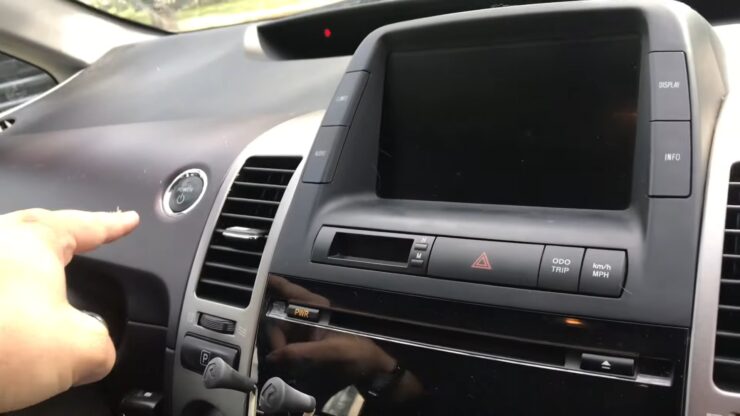
01. Cold But Not Cool Air
When the AC is turned on, the fan cranks up and the condenser cools the output of the compressor to bring the temperature in the car to its lowest.
However, when the air doesn’t feel cold enough, it is a warning sign of reversible damage to the AC cooling system. This problem could be due in part to a leaky refrigerant; Often limiting the maximum flow of cool air through the vents.
It can also be caused by a damaged compressor thereby reducing the rate at which the refrigerant gets to the rest of the cooling system.
02. Odd Noises Arising from the Compressor
The working condition of the compressor of any air condition is core to its functionality. Most time, it is the first contact for diagnosing abnormal sounds in an AC.
The compressor uses a sealed bearing to guide its movement and this bearing can wear out when it is poorly lubricated; often producing a grinding sound of metal-to-metal.
Other unusual sounds may be due to internal part breakage or an interruption by either the belt pulley or the compressor clutches.
03. Oil Leaks
The bearing of a compressor doesn’t just dictate its orientation, it also helps prevent oil leaks while the compressor does its work.
Oftentimes, oil spillage results from the failure of the bearing to hold out lubricants. Oil spillage also derives from a weary and aging condenser.
Since the condenser receives refrigerant at high pressure, fragile components of a condenser such as a seal can let out oil during operations.
Common Prius Air Conditioning Problems
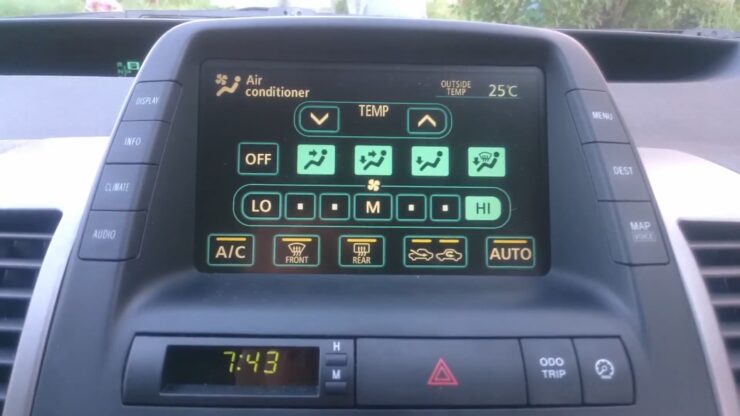
01. Failed compressor
The major problem of the compressor lies in its non-usage, by which period, the oil in the bearing and seals settles and dries out, such that when it is turned on again, it is unable to deliver pressurized air to the condenser.
Since a failed compressor can’t build up pressure, this problem can be diagnosed by observing the pressure gauge meter of the compressor.
02. Selective compressor oil
A typical Prius compressor is equipped with a special compressor oil; a special ester with a delicate mixture of additives.
This special Ester offers maximum protection against the high voltage that passes through the compressor when the AC is turned on.
As such, there is always a risk of being electrocuted when another universal oil is used.
03. Leaks
Two types of leaks occur in a Prius air condition system; refrigerant leak and compressor oil leak. A refrigerant leak is the least noticeable since the gas leaking out of the compressor is colorless and odorless.
This leakage is sometimes due to a reduction in the efficiency of the seals and bearing. The outcome of such a leak may be a reduction in the amount of air coming out of the radiators.
Moreover, damaged or aged body parts can also result in oil leakage.
04. Overcharged Air Condition
Oftentimes, the system gets overcharged when a naive user seeks alternatives to moderately cool air by stocking the AC with more than enough refrigerant.
When the Prius air condition gets overcharged, the compressor system is doomed to fail because of excess refrigerant in the compressor system.
The net consequence of this is the overworking of the compressor; leading to the giving off of hot air. The excessive pressure that also builds up as a result of excess refrigerant could push liquid into the lubricant, Putting the compressor in harm’s way.
05. Blown Fuse
In this rather complicated circuit of a Prius AC, the fuse functions as a safety device to prevent overvoltage in the air condition system.
Thus, when a sudden change occurs in a Prius AC, or any of the electrical components stop working, the fuse might have been blown.
Every Prius AC fuse has an ampere rating above which the fuse would blow off, when it does happen, the whole system shuts down until the fuse is replaced.
06. Clog in the Expansion Valve
The valve helps to control the refrigerant the evaporator receives. However, when there is a clog in the expansion valve, hot air is delivered at a continuous rate; usually requiring the owner to shut down before the car cools down.
Instead of receiving cool refrigerants from the condenser, hot air accumulates in the tubes, preventing the cooling of the gaseous air.
Unless the entire system is completely discharged, the hot air will constitute blockage in the low side of the compressor, sabotaging any attempt to replace refrigerant.
Solutions of Prius Air Conditioning Problems
01. Failed Compressor
The solution to a failed Prius compressor depends on the degree of damage or failure of the device.
Repair or replacing its parts becomes an option when your budget is not flexible, however, replacing the entire compressor system offers more value for money.
Since obstruction and leaks are often the causes of a failed Prius compressor, the ideal method of repair should include the complete evacuation of refrigerants and conducting leak checks.
This would cost you about 80 to 90 dollars depending on your location.
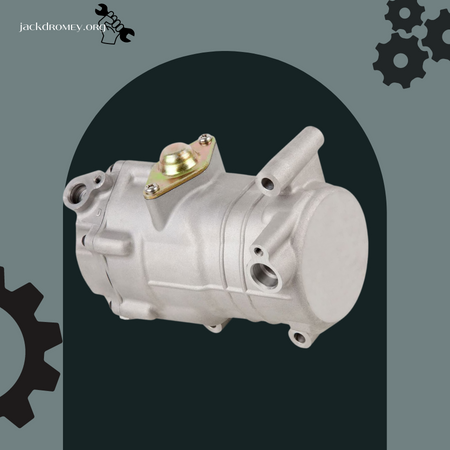
02. Leaks
There are two important steps to solving the problem of leakage in a Prius AC. The first is to identify the source of the leakage, and the second is to recharge the system with a suitable refrigerant.
This is because a leak is most difficult to spot when there is no gas in circulation.
Also, since the refrigerant is colorless and odorless, it is pertinent to use phosphorescent fluid, which will pass through the various tubes in the components.
During this movement, a suitable lamp for spotting this colored fluid can be used to highlight the leakages.
Another effective way of detecting leakage is through the use of solid electrolyte semiconductor detectors such as Robinair detectors. This video will help you see how to use leak detectors.
Replacing refrigerants could cost between $45 to $85. However, if you factor in the cost of equipment and manpower, leak repair could gulp as high as $250 to $450.
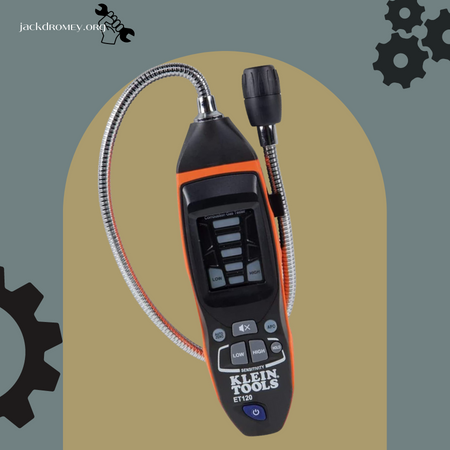
03. Overcharging
An overcharged Prius AC means that there are more than enough freons (refrigerant) for the compressor to help circulate through to the other components of an air conditioner.
Therefore, the simple solution is to discharge the system.
04. Blown Fuse
A blown fuse is not repairable, i.e the damage cannot be reversed as it is a delicate and fragile device for regulating voltage in a car AC.
However, they are easily replaceable since excess voltage through the AC components can affect the functionality of the entire system.
Moreover, it is prudent to allow a professional mechanic to handle the replacement, so as to detect and assess other damages that the blown fuse might have caused.
05. Clog in the Expansion Valve
A blocked valve constitutes a major challenge to Prius AC, often preventing the passage of refrigerant to the evaporator. This problem usually manifests through the release of warm air through the vents.
The ideal solution is to replace the valve to guarantee the maximum function of the AC. Replacement cost varies between $190 to $400. This includes the charge for labor and equipment.
06. Fixing overcharged AC in Car system
An overcharged AC can damage the compressor system and blow out warm air through the vents.
The only solution, in this case, is to discharge the AC, I.e., remove excess refrigerant. The following are steps by which an AC can be discharged:
Step 1:
Get a pressure gauge, a flat surface nail, and a rag.
The pressure gauge is to determine the amount of refrigerant present in the system, and the rag serves as a protective covering for your hands against frostbite.
Step 2:
Turn on the car and press the AC max button. Connect the pressure gauge hose to the pressure valve of the condenser. Observe the scale and confirm that the Mark is on the red part of the scale.
Step 3:
Wrap the rag around the nail, this is to prevent frostbite as the air gushing out is at a freezing temperature. Poke the opening of the valve to allow the escape of air against the rag.
Do this until there is a yellow stain on the rag; this confirms that compressed air has been eliminated and only fluid is left in the system.
This video gives an insight into the discussed steps.
Repair costs run into thousands of dollars.
Causes of AC Problems in a Car
01. Damaged compressor
This is the most important aspect of a car AC system. It keeps the refrigerant in circulation and compresses it against the condenser for cooling.
When a compressor is damaged, hot air could accumulate in the car even when the AC is turned on.
02. Electrical problem
It takes more than the information in the user manual to be able to diagnose electrical problems.
As such, the service of a technician is usually required to discern electrical problems in a car AC. Much of the electrical problems arise from a blown fuse and wrong wiring.
03. Leaking Refrigerant
Refrigerants or coolants have different escape routes in a car AC system. Oftentimes, coolants escape along with the hose connections to the various tubes in a car AC.
However, it is difficult to correctly pinpoint the spot of the leak and this is where the use of a phosphorescent fluid and a leak detector comes in handy.
While ensuring your comfort with a well-functioning air conditioning system is essential, it’s also critical to know how to handle situations like a dead battery, so consider reading our step-by-step guide on jump-starting a Prius in case you find yourself in need.
Prevention of AC Problems
01. Regular Servicing
Time has a debilitating effect on anything that breathes and moves; they get weary and old. A car AC system is not an exception as microorganisms, dust, and other debris can form a clog on the AC ducts and vents.
As such, the AC should be serviced at least once every 4 to 5 months. This is to not only ensure a healthy cooling system but also to save the cost of replacing components.
02. Use Sealant to Prevent Refrigerant Leakage.
A leakage anywhere in an AC is indicative of weary hose connections. To prevent this, you have to use sealants to glue hose connections especially when the oil begins to accumulate at such places.
03. Use of Recommended Compressor Oil
The high voltage that passes through the compressor underlines the importance of insulating media. This is provided by the compressor oil as it ensures that the voltage is properly grounded.
However, when the recommended oil is not used, it can cause electric shock when handled inappropriately.
FAQs
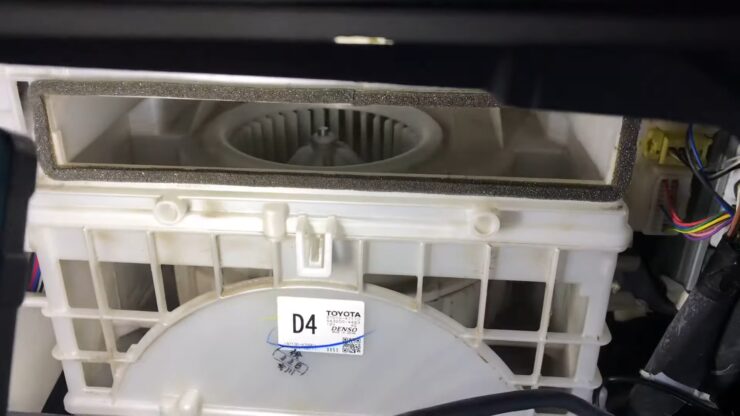
Why is my car air conditioning suddenly not cold?
Some reasons why your conditioning suddenly stops being cold include:
- Compressor damage
- Refrigerant leak
- Broken fan
What are the signs of a bad air conditioning compressor?
The signs of a bad air conditioning compressor include the following:
- Warm air
- Abnormal noise
- Refrigerant leakage
- The electrical shock when touched
- Reduced airflow
- Compressor not turning on.
What makes the Prius AC not turn on?
The following are reasons why a Prius AC won’t turn on:
- If your AC has not been in use for a long time
- A faulty or blown fuse
What should I do when my air conditioning isn’t cold?
The first thing to do is to check for compressor, fan, condenser, and expansion valve damage. A warm AC can also be due to leaky refrigerant. If any of these is the case, see a professional for repair.
What can I do when my AC is overcharged?
An overcharged AC requires a discharge for optimum function. You can do this using a vacuum machine to suck out the excess coolants.
Moreover, the AC can also be discharged manually using a towel and a flat-faced nail. Open the compressor valve and poke the nail into it with the towel wrapped around your hand.
This will discharge the excess air and reduce the pressure on the compressor.
Why does my car air conditioning smell bad?
If you notice a bad smell coming from your car air conditioning, it may be due to the growth of bacteria or mold in the system.
This can occur when moisture is trapped in the system, which creates a damp environment for bacteria and mold to thrive.
It can also be due to dirty or clogged air filters that haven’t been changed regularly.
To resolve this issue, you may need to have your air conditioning system cleaned or disinfected by a professional, and make sure to change your air filters regularly.
How often should I replace the refrigerant in my car air conditioning?
The frequency of refrigerant replacement in a car air conditioning system depends on the manufacturer’s recommendation and the usage of the system.
However, as a general rule, it’s recommended to have your refrigerant checked and topped off every 1-2 years.
This is to ensure that the refrigerant level is adequate for proper cooling and to prevent any damage to the compressor or other components of the system.
Can I recharge my car air conditioning myself?
While it is possible to recharge your car air conditioning system yourself using a DIY kit, it’s not recommended unless you have experience with automotive repair and air conditioning systems.
This is because adding too much refrigerant or using the wrong type of refrigerant can damage the compressor or other components of the system, leading to expensive repairs.
It’s best to leave this task to a professional who has the necessary tools and expertise to do it correctly.
How can I tell if my car air conditioning needs to be serviced?
Some signs that your car air conditioning may need to be serviced include reduced cooling performance, unusual noises or vibrations, bad smells, or leaks. It’s also a good idea to have your air conditioning system serviced regularly, at least once every 4-5 months, to prevent any potential issues and to ensure optimal performance.
Can I use a different type of refrigerant in my car air conditioning system?
No, you should never use a different type of refrigerant in your car air conditioning system than the one recommended by the manufacturer.
This is because each type of refrigerant has specific properties that are designed to work with the specific components of the system, and using the wrong type can damage the compressor or other components.
It’s always best to use the recommended type of refrigerant to ensure the safety and optimal performance of your car air conditioning system.
Conclusion
Prius air conditioning problems often present a plethora of challenges to its user, especially those that favor Prius products over others.
The common problems generated from the use of this AC include damaged compressors, refrigerant leaks, overcharged AC, a blown fuse, and clogs in the expansion valve.
This article provides solutions to aid or guide users in discerning these challenges.

